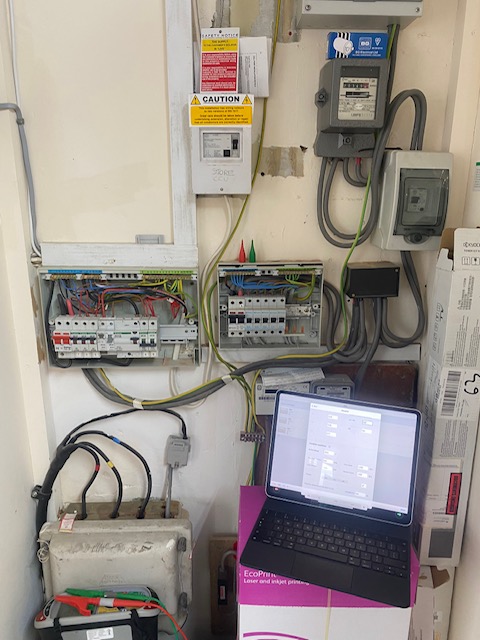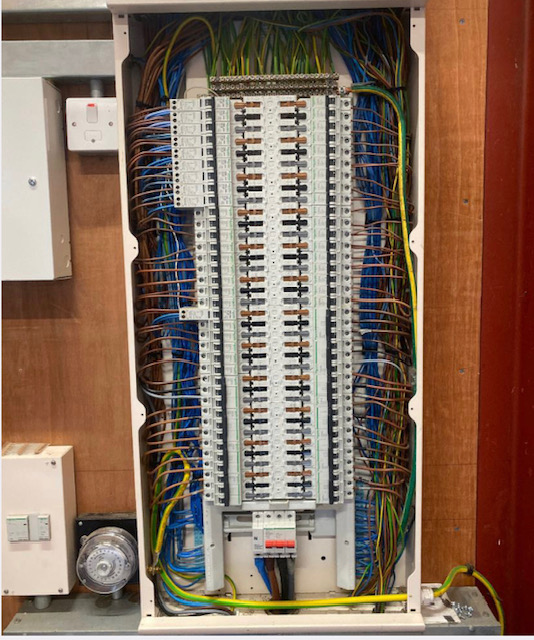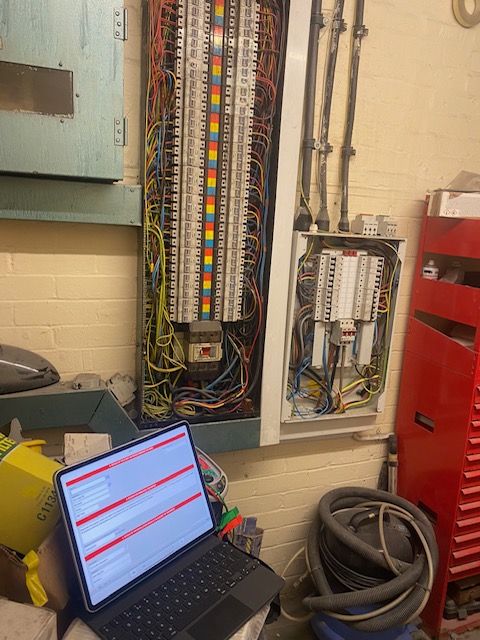Electrical Safety Certificate
Electrical safety is a paramount concern for homeowners and landlords across the UK. With the increasing reliance on electrical systems in our daily lives, ensuring that these systems are safe and compliant with regulations is essential. Electrical faults can lead to severe consequences, including fires, injuries, and even fatalities. Therefore, obtaining an Electrical Safety Certificate is not merely a regulatory requirement; it is a critical step in safeguarding your property and its occupants.
An Electrical Safety Certificate, commonly known as an Electrical Installation Condition Report (EICR), is a formal document that confirms the safety and compliance of electrical installations within a property. This certificate is issued following a thorough inspection by a qualified electrician, ensuring that all electrical systems are functioning correctly and adhere to the current safety standards.

Definition of Electrical Safety Certificates (EIC and EICR)
Electrical Safety Certificates encompass two primary types: the Electrical Installation Certificate (EIC) and the Electrical Installation Condition Report (EICR).
- Electrical Installation Certificate (EIC): This certificate is issued when new electrical installations are completed or when significant alterations are made to existing systems. It confirms that the installation has been designed, installed, and tested in accordance with the current Wiring Regulations (BS 7671).
- Electrical Installation Condition Report (EICR): This report is conducted on existing electrical installations to assess their safety and compliance. It is essential for identifying any deterioration or faults that may have developed over time.
Importance of These Certificates for Homeowners and Landlords in the UK
For homeowners, having a valid Electrical Safety Certificate provides peace of mind, knowing that their electrical systems are safe and compliant. For landlords, it is not only a matter of safety but also a legal obligation. The recent changes in legislation require landlords to ensure that their properties are electrically safe, and failure to do so can lead to significant repercussions.
Overview of the Inspection Process and What It Entails
The inspection process for obtaining an Electrical Safety Certificate involves a comprehensive assessment of the electrical systems within a property. A qualified electrician will:
- Conduct Visual Inspections: Examine the condition of wiring, sockets, switches, and consumer units.
- Test Electrical Installations: Perform a series of tests to assess the functionality and safety of the electrical systems.
- Identify Potential Hazards: Look for any signs of wear and tear, outdated installations, or non-compliance with safety regulations.
- Provide Recommendations: Offer guidance on necessary remedial work or upgrades to ensure compliance and safety.
Upon completion of the inspection, the electrician will issue the appropriate certificate, detailing the findings and confirming whether the electrical installations meet the required safety standards.

Explanation of Legal Requirements for Landlords Regarding Electrical Safety
In the UK, landlords are legally required to ensure that their properties are electrically safe. The Electrical Safety Standards in the Private Rented Sector (England) Regulations 2020 mandate that landlords must have their electrical installations inspected and tested at least every five years. Additionally, they must provide tenants with a copy of the Electrical Installation Condition Report (EICR) within 28 days of the inspection.
Consequences of Non-Compliance (Fines, Legal Issues)
Failure to comply with these legal requirements can lead to severe consequences for landlords. Non-compliance can result in:
- Fines: Landlords may face financial penalties of up to £30,000 for failing to comply with electrical safety regulations.
- Legal Action: Tenants may take legal action against landlords for failing to provide a safe living environment, leading to potential lawsuits and compensation claims.
- Loss of Reputation: Non-compliance can damage a landlord’s reputation, making it difficult to attract tenants in the future.
Common Electrical Hazards and Risks
Electrical hazards pose significant risks to properties and their occupants. Common hazards include:
- Faulty Wiring: Deteriorating or improperly installed wiring can lead to short circuits and electrical fires.
- Overloaded Circuits: Plugging too many devices into a single outlet can cause overheating and increase the risk of fire.
- Defective Appliances: Malfunctioning appliances can pose electrocution risks and lead to electrical fires.
How Regular Inspections and Certificates Help Mitigate These Risks
Regular inspections and obtaining Electrical Safety Certificates are crucial for mitigating these risks. By identifying potential hazards early, property owners can take proactive measures to rectify issues before they escalate into serious problems.
Routine inspections ensure that electrical systems are functioning correctly and comply with current regulations, significantly reducing the likelihood of electrical accidents.
Furthermore, having a valid Electrical Safety Certificate demonstrates a commitment to safety, protecting both the property and its occupants. This section of the article provides a comprehensive overview of the importance of Electrical Safety Certificates, the legal obligations for landlords, and the role of regular inspections in preventing electrical hazards.
How Having an Electrical Safety Certificate Can Enhance Property Marketability
An Electrical Safety Certificate can significantly enhance the marketability of a property. In a competitive rental or sales market, having a valid certificate sets a property apart from others that may not have undergone recent inspections. Prospective tenants and buyers are increasingly looking for properties that demonstrate a commitment to safety and compliance, and a valid Electrical Safety Certificate serves as a strong indicator of this.
Moreover, properties with up-to-date safety certifications are often perceived as more reliable and well-maintained. This perception can lead to quicker sales or rental agreements, as potential tenants and buyers are more likely to choose a property that offers them peace of mind regarding electrical safety.
Importance for Prospective Buyers and Investors
For prospective buyers and investors, an Electrical Safety Certificate is a critical factor in the decision-making process. It provides assurance that the electrical systems are safe and compliant, reducing the likelihood of unexpected expenses related to repairs or upgrades shortly after purchase. Buyers are increasingly aware of the importance of safety certifications, and having a valid certificate can make a property more attractive.
Investors, in particular, will appreciate the added value that a valid Electrical Safety Certificate brings to their portfolio. It not only enhances the property’s marketability but also contributes to long-term profitability by reducing the risks associated with electrical hazards.

Role of Electrical Safety Certificates in Securing Insurance
Electrical Safety Certificates play a crucial role in securing insurance coverage for properties. Many insurance providers require proof of electrical safety as part of their underwriting process. A valid certificate demonstrates that the electrical systems have been inspected and deemed safe, which can influence the terms and conditions of the insurance policy.
Having an up-to-date Electrical Safety Certificate can also lead to lower premiums, as insurers view properties with certified electrical systems as lower risk. This can result in significant savings for property owners over time.
Potential Risks of Being Uninsured Due to Lack of Certification
The risks associated with not having an Electrical Safety Certificate can be severe. Without proper certification, property owners may find themselves uninsured in the event of an electrical fire or accident. Insurance companies may deny claims if it is discovered that the property did not meet safety standards, leaving owners to bear the financial burden of damages and repairs.
Furthermore, operating without a valid Electrical Safety Certificate can result in legal liabilities, particularly for landlords. If a tenant suffers an injury due to electrical faults, the lack of certification can be used against the landlord in court, leading to costly legal battles and compensation claims.
Overview of NAPIT as a Governing Body in the UK
The National Association of Professional Inspectors and Testers (NAPIT) is one of the leading governing bodies in the UK that oversees electrical safety standards. Established to promote high standards in the electrical industry, NAPIT provides accreditation to electricians and contractors who meet their rigorous criteria. This ensures that electrical work is carried out safely and competently across the country.
Importance of Choosing NAPIT-Registered Electricians for Inspections
Choosing a NAPIT-registered electrician for electrical inspections and certifications is essential for ensuring quality and compliance. NAPIT-registered electricians have undergone extensive training and are regularly assessed to maintain their accreditation.
This means that when you choose a NAPIT-approved contractor, you can be confident that you are receiving the highest standard of service and expertise.
Additionally, NAPIT provides a framework for its members to stay updated on the latest regulations and best practices in the industry, further enhancing the safety and reliability of electrical work performed.
Conclusion
In conclusion, obtaining an Electrical Safety Certificate is not merely a regulatory requirement; it is a crucial investment in the safety and well-being of your property and its occupants. These certificates, including the Electrical Installation Certificate (EIC) and the Electrical Installation Condition Report (EICR), provide essential assurances that electrical systems are safe, compliant, and functioning optimally. By prioritising electrical safety, property owners can mitigate risks, enhance property value, and foster trust with tenants.
With the backing of NAPIT as a governing body, you can be assured that the electricians conducting these inspections adhere to the highest standards of safety and professionalism. This commitment to quality not only protects lives but also contributes to a safer environment for everyone.
Let’s Talk: Your Trusted Partner in Electrical Safety
At MC Electrical, we offer a full range of certification services to ensure your electrical installations are safe and compliant. Our services include:
- EIC Electrical Installation Certificate: For new installations or significant alterations, ensuring compliance with safety standards.
- EICR Electrical Installation Condition Report: A thorough assessment of existing electrical systems to identify any potential hazards.
- Danger Notices Reports: Clear documentation of any identified risks, ensuring that necessary precautions are taken.
As a NAPIT-approved contractor, we pride ourselves on delivering high-quality electrical services throughout Essex and Chelmsford. Talk to our expert team about your electrical project details today!
Your safety is our priority—let us help you protect your property today!
EXCELLENTTrustindex verifies that the original source of the review is Google. We used Matt to re wire our house after we moved in he was excellent. The old wiring was dangerous he gave us temporary safe electrics, he worked with us to position sockets and switches, we were fully kept up to date on what he was doing and when things would be done, he made suggestions on better ways of doing things which has saved us money. He went over and above what he had to do to keep us safe warm and as comfortable as we could be during the works he was clean and tidy. I would recommend him to anyone absolutely brilliant servicePosted onTrustindex verifies that the original source of the review is Google. I recently hired Matthew from MC Electrical for some electrical work in my home, and I couldn't be more pleased with the experience. From start to finish, Matthew displayed a high level of professionalism and expertise that truly impressed me. Firstly, the communication was excellent. Matthew was prompt in responding to my inquiry and provided a detailed estimate that was fair and transparent. He scheduled an appointment quickly and arrived right on time, which I greatly appreciated. Thanks againPosted onTrustindex verifies that the original source of the review is Google. Great electrician, explained everything and was very patient, would recommend anytimePosted onTrustindex verifies that the original source of the review is Google. Matt did the electrical installation for our stair lift he was dry professional,tidy and carried out all work in a neat and timely way.Matt also did another electrical job for me for which I am a very grateful I would definitely recommend him for any electrical work.Posted onTrustindex verifies that the original source of the review is Google. Matt certainly knows his stuff and is very thorough. He has completed work both inside & outside for us and also to correct work previously done by others. Highly recommended.Posted onTrustindex verifies that the original source of the review is Google. We recently required some extensive plumbing work, during the course of which some potentially dangerous electrical wiring was exposed in the kitchen wall. Matt stepped in at very short notice and immediately resolved the situation, making everything safe. He also carried out some additional electrical work. He was very helpful, thorough and professional and I would highly recommend his services.Posted onTrustindex verifies that the original source of the review is Google. Excellent professional electrician, tidy worker. Very efficient and knowledgeable. Completely professional service from start to finish. Recommend highly by a friend and was not disappointed. Fully qualified and up to date.Posted onTrustindex verifies that the original source of the review is Google. We needed our (very old) fuse board replaced and tested, and Matt was great! He explained everything thoroughly so we understood what needed doing and why, and carried out the work promptly and to a high standard. Would definitely recommend.Posted onTrustindex verifies that the original source of the review is Google. I would highly recommend this Electrician to anyone as I’ve used Matt on many occasions. His work and demeanour are second to none but I think a lot of this is due to his Military background. His qualifications speak for themselves and he excels in fault finding .



